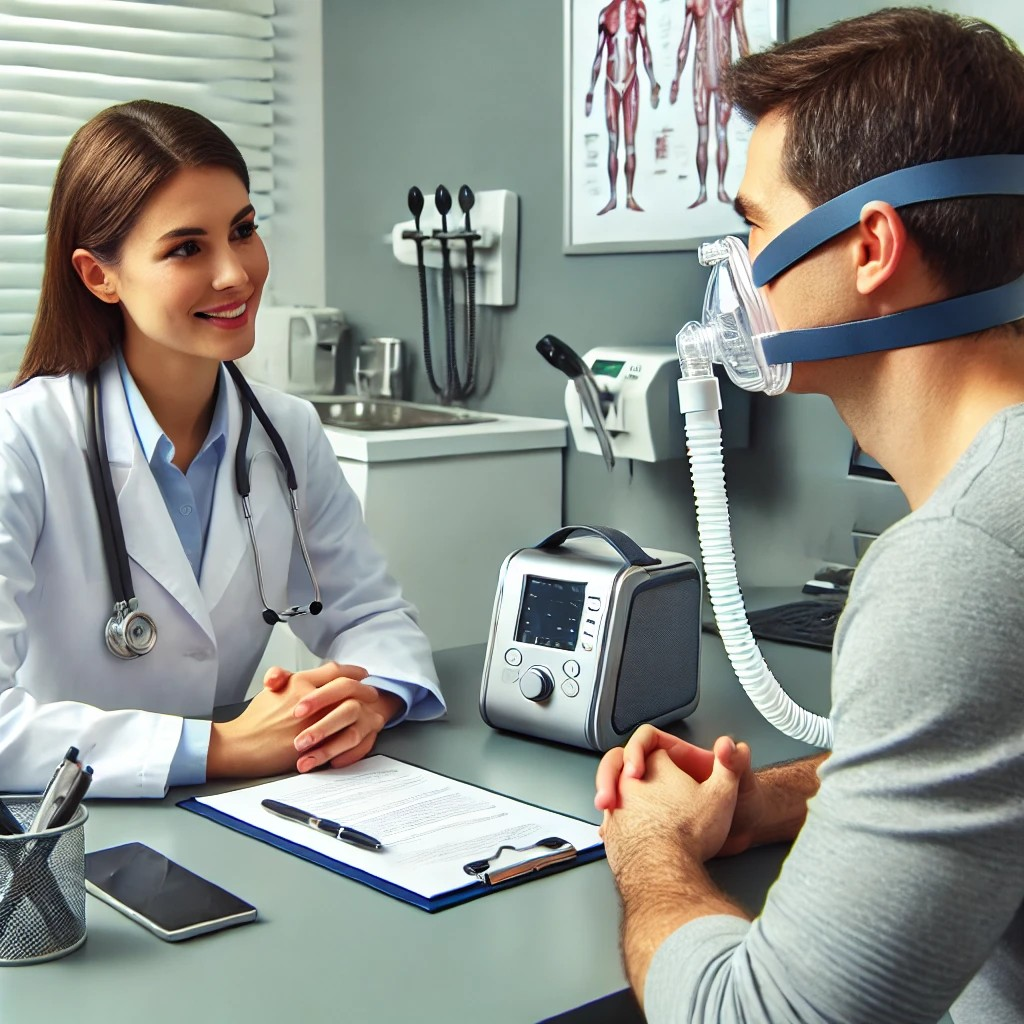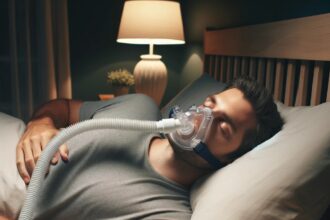Continuous Positive Airway Pressure (CPAP) therapy has become a standard treatment for those suffering from obstructive sleep apnea, a condition characterized by the frequent collapse of the airway during sleep. The benefits of CPAP therapy are well-documented; it helps keep the airway open by delivering a steady stream of air through a mask, improving sleep quality and reducing the risk of serious health issues. However, some users may experience an unexpected side effect: gas or bloating. This can lead to discomfort and concerns about whether CPAP is the right, sleep apnea treatment, for them.
Yes, CPAP can cause gas, a condition often referred to as aerophagia. Aerophagia occurs when air is swallowed and then enters the stomach or intestines, leading to gas, bloating, and even stomach pain. The introduction of pressurized air through a CPAP machine can contribute to this condition, making it an uncomfortable experience for some patients. If you are experiencing these symptoms, it’s important to understand why this happens and how to address it. Mass Tort America understands the challenges faced by those dealing with CPAP related aerophagia-related issues and can provide the guidance and support needed to navigate these concerns.
Understanding Aerophagia And Its Causes
Aerophagia, literally meaning “air swallowing,” is a phenomenon that occurs when too much air enters the digestive system. In the context of CPAP therapy, this happens when the pressurized air intended to keep your airway open inadvertently makes its way into your esophagus and stomach. This can happen more frequently if the CPAP pressure settings are too high, or if the mask does not fit properly, allowing excess air to escape and be swallowed.
The type of mask used in CPAP therapy can also play a significant role in the development of aerophagia. For instance, full-face masks that cover both the nose and mouth may increase the likelihood of swallowing air compared to nasal masks that only cover the nose. Additionally, individuals who naturally breathe through their mouth while sleeping might be more prone to this issue. Understanding the interplay between mask type, CPAP pressure, and individual breathing habits is crucial for mitigating this uncomfortable side effect.
Certain sleeping positions may exacerbate the problem. For example, lying flat on your back can increase the chances of air entering the stomach. Adjusting sleeping posture, such as elevating the head or sleeping on the side, can sometimes reduce the occurrence of aerophagia symptoms. Therefore, it’s important to explore different sleeping positions in conjunction with your CPAP therapy to find the most comfortable and effective setup.
Potential Solutions And Adjustments
If you are experiencing gas or bloating due to CPAP therapy, there are several strategies that might help alleviate these symptoms. First, consult with your healthcare provider about adjusting the pressure settings on your CPAP machine. Lowering the pressure slightly may reduce the amount of air swallowed without compromising the effectiveness of the treatment. It’s crucial to make these adjustments under professional guidance to avoid undermining the therapy’s benefits.
Switching to a different type of CPAP mask might also make a significant difference. For instance, if you are using a full-face mask, you might want to try a nasal mask or nasal pillows, which can reduce the amount of air that enters your mouth and, subsequently, your stomach. Mask fit is another critical factor—ensuring that your mask fits snugly without leaks can prevent unnecessary or excessive air swallowing and intake, thus reducing the likelihood of aerophagia.
In addition to these adjustments, adopting certain lifestyle changes can help. For example, avoiding large meals or carbonated beverages before bedtime can minimize the chances of gas and bloating. These small changes can make a big difference in your comfort level while using CPAP therapy. It’s important to approach CPAP therapy holistically, addressing both the technical aspects of the equipment and the personal habits that might influence your experience.
The Role Of CPAP Machine Settings
The settings on your CPAP machine play a critical role in your overall comfort and the effectiveness of your therapy. If the pressure is set too high, it can increase the likelihood of extra air from being forced into your stomach, leading to gas and bloating. On the other hand, if the pressure is too low, the therapy may not be effective in keeping your airway open, which can lead to disrupted sleep and other health issues.
Some CPAP machines come with a feature called “ramp mode,” which gradually increases the pressure over time as you fall asleep. This can help reduce the initial discomfort of high pressure and minimize the risk of swallowing air. Additionally, machines with advanced algorithms can automatically adjust pressure throughout the night based on your breathing patterns, which can during sleep medicine also help mitigate aerophagia.
It’s important to work closely with your healthcare provider to determine the optimal settings for your CPAP machine. Regular monitoring and adjustments may be necessary to ensure that your therapy remains both effective and comfortable. If you continue to experience discomfort, your provider may suggest a different type of machine, such as a BiPAP (Bilevel Positive Airway Pressure) machine, which offers different air pressure and levels for inhalation and exhalation.
How Mask Fit Affects Aerophagia
A well-fitting CPAP mask is essential for effective therapy and for minimizing side effects like aerophagia. If the mask is too loose, it can allow air to escape, which may lead stomach discomfort due to swallowing air and subsequent gas or bloating. On the other hand, a mask that is too tight can cause discomfort and may still not provide a proper seal, leading to similar issues.
There are several types of CPAP masks available, including nasal masks, full-face masks, and nasal pillows. Each type has its own advantages and may be more suitable for certain individuals depending on their breathing habits, facial structure, and comfort preferences. For example, a nasal mask may be more comfortable for those who primarily breathe through their nose, while a full-face mask may be necessary for those who breathe through their mouth.
It’s crucial to regularly check the fit of your CPAP mask and make adjustments as needed. Your mask should fit snugly but comfortably, without causing irritation or allowing air to leak. If you’re having trouble finding a mask that fits well, consult with your healthcare provider or a CPAP technician who can help you find the right option.
The Impact Of Sleeping Position
Your sleeping position can significantly influence the effectiveness of CPAP therapy and the likelihood of experiencing aerophagia. For instance, sleeping on your back can make it easier for air to enter the stomach, as this position may cause the tongue and soft tissues in the throat to collapse, leading to increased pressure in the upper airway itself.
Many CPAP users find that sleeping on their side reduces the occurrence of gas and bloating. Side sleeping helps to keep the airway open naturally, which can reduce the need for higher CPAP pressures and minimize the risk of swallowing air. Additionally, elevating the head of the bed can help prevent air from entering the stomach by using gravity to move excess gas and keep the airway open.
Experimenting with different sleeping positions and adjustments to your bed setup can help you find the most comfortable and effective way to use CPAP therapy. If you continue to experience discomfort despite trying these changes, it may be helpful to consult with a sleep specialist who can provide further guidance.
The Role Of Diet In Managing CPAP-Induced Gas
Dietary habits can play a significant role in managing gas and bloating associated with CPAP therapy. Certain foods and beverages can increase the likelihood of gas, particularly those that are high in carbonated content or difficult to digest. For example, drinking soda or eating large meals close to bedtime can contribute to discomfort during the night.
It’s advisable to avoid foods that are known to cause gas, such as beans, cabbage, and certain dairy products, especially in the hours leading up to bedtime. Additionally, limiting the intake of fatty or fried foods can help reduce the chances of experiencing gas or bloating during CPAP therapy. Instead, focus on a balanced diet that includes plenty of fiber, which can help regulate digestion and reduce the likelihood of gas.
Hydration is also important, but it’s best to limit the amount of fluids consumed right before bed to reduce the risk of nighttime bathroom trips, which can disrupt sleep. By making mindful choices about your diet and hydration, you can help minimize the side effects of CPAP therapy and improve your overall comfort during the night.
The Psychological Impact Of CPAP-Related Discomfort
For many CPAP users, the physical discomfort associated with gas and bloating can also have psychological effects. The frustration of dealing with side effects may lead to anxiety about using the machine, which in turn can affect sleep quality and overall well-being. In some cases, this discomfort can even result in individuals discontinuing CPAP therapy altogether, which can have serious health implications.
It’s important to address these concerns proactively. Understanding that gas and bloating are common side effects and that there are strategies to manage them can help reduce anxiety and improve compliance with therapy. Additionally, talking to a healthcare provider or joining a support group for CPAP users can provide reassurance and practical advice for dealing with these issues.
Maintaining a positive mindset and focusing on the long-term benefits of CPAP therapy can also help you stay motivated. Remember that managing sleep apnea is crucial for your health, and while the side effects can be challenging, they are often manageable with the right approach.
Common Myths About CPAP And Aerophagia
There are several myths surrounding CPAP therapy and its side effects, including the belief that gas and bloating are unavoidable or that CPAP therapy is not effective if these symptoms occur. It’s important to separate fact from fiction to ensure that you make informed decisions about your treatment.
One common myth is that increasing CPAP pressure will always make therapy more effective, but this is not necessarily true. Higher pressure settings can actually increase the risk of aerophagia, so it’s important to find the right balance that keeps your airway open without causing unnecessary side effects. Working with a healthcare provider to adjust your settings can help you achieve this balance.
Another myth is that switching to a different type of mask will completely eliminate the risk of gas and bloating. While mask type and fit are important factors, they are just one piece of the puzzle. Addressing other aspects, such as sleeping position and diet, is also crucial for managing side effects. Understanding the complexities of CPAP therapy can help you make better choices and improve your overall experience.
How CPAP-Related Gas Affects Daily Life
The discomfort caused by CPAP-related gas and bloating can extend beyond the night and affect your daily life. Persistent discomfort can lead to fatigue, irritability, and even digestive issues during the day. These symptoms can make it difficult to focus on work, enjoy social activities, or engage in physical exercise, ultimately impacting your quality of life.
For some individuals, the embarrassment associated with gas and bloating may also affect their relationships and self-confidence. It’s important to address these concerns and seek solutions to minimize their impact on your daily life. Whether it’s through dietary changes, adjustments to your CPAP therapy, or seeking professional support, there are ways to manage these side effects effectively.
Improving your comfort with CPAP therapy can have a positive ripple effect on other areas of your life. By addressing the root causes of your discomfort, you can enhance your sleep quality, boost your energy levels, and regain control over your daily routine.
The Importance Of Regular Follow-Ups
Regular follow-ups with your healthcare provider are essential for managing CPAP therapy and addressing any side effects, including gas and bloating. These appointments provide an opportunity to review your therapy progress, make necessary adjustments to your machine settings, and discuss any concerns you may have.
During follow-ups, your healthcare provider can also check for any underlying issues that may be contributing to your discomfort, such as mask leaks or improper pressure settings. They may recommend additional tests or a sleep study to gather more information and ensure that your therapy is optimized for your needs.
Regular communication with your provider helps ensure that your CPAP therapy remains effective and that any side effects are promptly addressed. Don’t hesitate to reach out if you experience discomfort, as early intervention can prevent more serious issues from developing.
How CPAP-Related Discomfort Can Be Legally Addressed
In some cases, CPAP-related discomfort, such as persistent gas and bloating, may be linked to a malfunctioning machine or an issue with the equipment provided by the manufacturer. If you suspect that your CPAP machine is defective or that the side effects are more severe than anticipated, you may have legal options available to address these concerns.
Legal claims related to CPAP therapy often involve product liability or medical negligence. For example, if the machine was improperly calibrated, resulting in excessive air pressure that led to serious discomfort, you may be able to seek compensation for the harm caused. It’s important to document your symptoms and any interactions with healthcare providers or the manufacturer to support your case.
Consulting with a legal expert who specializes in medical devices can help you understand your rights and determine whether you have a valid claim. Mass Tort America has experience handling such cases and can provide the guidance you need to navigate the legal process.
What To Do If CPAP Therapy Isn’t Working For You
If you find that CPAP therapy is not providing the relief you need, or if the side effects are too difficult to manage, it’s important to explore alternative treatment options. There are several alternatives to CPAP that may be more suitable for your specific needs and preferences.
One alternative is BiPAP (Bilevel Positive Airway Pressure) therapy, which offers different pressure settings for inhalation and exhalation, potentially reducing discomfort. Another option treat sleep apnea is an oral appliance, which is a custom-fitted device that helps keep the airway open by repositioning the jaw. For some individuals, surgery may be recommended to address the underlying causes of sleep apnea.
It’s essential to talk with your healthcare provider before altering your treatment plan. They can help you evaluate the pros and cons of each option and determine the best course of action based on your individual needs and medical history.
Why Choose Mass Tort America For Your CPAP Concerns?
If you’re struggling with CPAP-related gas and bloating, Mass Tort America is here to help. Our team is dedicated to supporting individuals across the nation who face challenges with their CPAP therapy. We understand the discomfort and frustration that can come with managing these side effects, and our concierge team is available to assist you in finding the right solutions. Whether it’s adjusting your treatment plan, exploring alternative therapies, or seeking legal advice for CPAP-related complications, we are here to guide you every step of the way.
At Mass Tort America, we prioritize your comfort and well-being. Our legal team has the experience and resources to address any CPAP-related issues you may be facing. Don’t let discomfort keep you from getting the sleep you need—reach out to us today. Contact Mass Tort America at 800-356-4338 or visit our contact form at https://masstortamerica.com/contact/ to learn more about how we can help you navigate your CPAP therapy challenges.



















